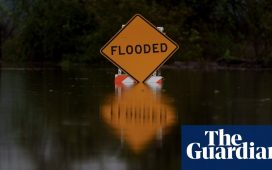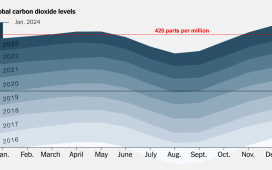Current temperature anomalies in the North Pacific and Atlantic suggest “it’s likely we’re going to get some blocking patterns setting up this summer,” she said. That could lead to hurricanes that also slow or stop, dumping enormous amounts of rain after strengthening off of the “supercharged battery” of unusually warm Atlantic waters.
The links between hurricanes and climate change are becoming more apparent over time. The overall number of storms could drop, Dr. Emanuel said, because factors like stronger wind shear could keep weaker storms from forming. But a warming planet can expect to see stronger hurricanes over time, and a higher incidence of the most powerful storms. Hurricanes are becoming wetter because of more water vapor in the warmer atmosphere; scientists have suggested storms like Hurricane Harvey in 2017 produced more rain than they would have without the human effects on climate. Also, rising sea levels are contributing to higher storm surge — the most destructive element of tropical cyclones.
Researchers have suggested that climate change is also causing some storms to intensify more rapidly — which, as a recent study in the journal Nature Communications puts it, “can lead to disastrous scenarios when coastal areas are not given adequate notice to evacuate and prepare for an extremely intense” storm. James Kossin, a climate scientist with NOAA and an author of the Nature paper, noted that hurricanes like Michael, which slammed into the Florida panhandle last year, show the kind of rapid intensification described in the paper, as did Harvey, Irma and Maria in 2017. However, he added, “trends like this tell us what’s happening in the broader sense and rarely apply to every single event.”
This season’s storm names include Barry, Chantal, Dorian, Erin, Fernand and Gabrielle, as well as Humberto, Imelda and Nestor. Should NOAA have underestimated the number of storms, we could see Sebastien, Van and Wendy.
In the announcement of the seasonal prediction, Daniel Kaniewski, acting deputy administrator of the Federal Emergency Management Agency, encouraged people to prepare for hurricane season by knowing evacuation routes ahead of time, purchasing flood insurance and having emergency provisions on hand — no matter how many storms are predicted. As he said, “It only takes one.”
For more news on climate and the environment, follow @NYTClimate on Twitter.


